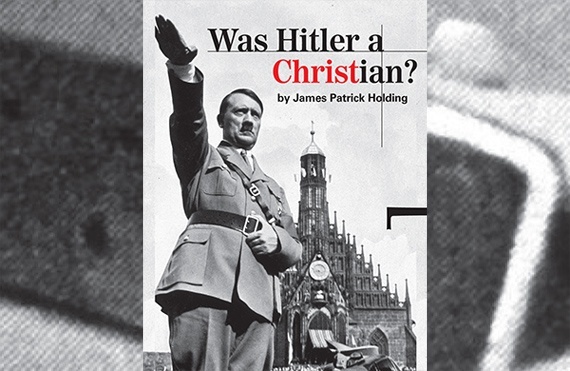This article first appeared in the CHRISTIAN RESEARCH JOURNAL, volume 37, number 01 (2014). The full text of this article in PDF format can be obtained by clicking here. For further information or to subscribe to the CHRISTIAN RESEARCH JOURNAL go to: http://www.equip.org/christian-research-journal/
“My feelings as a Christian point me to my Lord and Savior as a fighter.”
—Adolf Hitler
It is not difficult to find collections of quotes like this one, intended to prove that Adolf Hitler was a Christian. In many of his speeches and writings, Hitler referred to God or Jesus or quoted the Bible. Consequently, it is argued, Hitler must have been a believing Christian.
The matter, however, is not that simple. A Muslim may refer to God or Jesus, or allude to biblical teachings, but this does not make him or her a Christian.
Hitler’s religious beliefs have been the source of much misinformation. Some argue that while Hitler paid lip service to Christianity, he was actually an atheist. Others argue that Hitler was an occultist. The reality is that Hitler adhered to a system of belief that may be classified as pseudo-Christian and extremely heretical.
“POSITIVE CHRISTIANITY”
To understand Hitler’s religious beliefs we should start with a quote from Point 24 of the Nazi Party program: “The Party, as such, stands for positive Christianity, but does not bind itself in the matter of creed to any particular confession.” Critics may assume that Positive here means something affirming. But Positive Christianity, in this context, was a cultic movement with deviant beliefs. It began before Hitler’s birth, in the mid-nineteenth century, as an attempt to blend Christianity with an extremist form of German nationalism. Prior to the establishment of the Nazi Party, Positive Christianity was an ill-defined movement, with no clearly identifiable leaders or membership rolls. It was a grassroots ideology that infected established churches and their members and crossed denominational lines.1 However, adherents to Positive Christianity did share in common at least three important deviant beliefs.
The first deviant belief was a radically edited canon. Positive Christians rejected the Old Testament as “too Jewish.” They also rejected portions of the New Testament, including Matthew’s Gospel and the letters of Paul, who was deemed a “corrupter” of Christianity.
The second deviant belief was the redefining of Jesus as a non-Jew. Positive Christians envisioned Jesus as an Aryan, a member of the Nazi “master race.” Given Jesus’ professions to be intrinsically linked to the messianic promises of the Old Testament, to deny the Jewishness of Jesus is to deny a fundamental fact of Christianity. It is also contrary to biblical teachings relating Jesus’ Jewish ancestry (Matt. 1:1–17; Luke 2:11, 3:23–28; Rom. 1:3, etc.).
The final deviant belief was a focus on orthopraxy (right practice) at the expense of orthodoxy (right doctrine or belief). Positive Christianity strongly emphasized works, such that it not only failed to formulate doctrine but also ignored doctrine to the point of annihilation. Positive Christianity ignored doctrine because Nazi leaders wished to unify Catholics and Protestants. This could only happen if doctrine as a source of disagreement was eliminated.
HITLER’S SPIRITUAL BIOGRAPHY
The sparse accounts of Hitler’s life as a young man indicate a trajectory of early piety, followed by rebellion in youth. Hitler was raised Catholic and took part in church functions as a child. But as he got older, his interest in spiritual matters waned. His closest friend as a youth, August Kubizek, said, “For the entire period that I knew Adolf Hitler, I do not think he attended mass.”2 Hitler affirmed his lack of interest in religion as a youth, saying in 1942, “At thirteen, fourteen, fifteen, I no longer believed in anything, certainly none of my friends still believed in the so-called communion, only a few totally stupid honor students!”3 In the period following World War I, when the Nazi Party was still in its nascent stages, we find indications of Hitler’s allegiance to Positive Christianity.
Hitler’s Edited Bible
A 1919 manuscript written by Hitler outlines a plan for the biblical text: “Purification of the Bible—that which is consistent with our spirit. Second result: critical examination of the remainder.” This is “almost certainly an allusion to the Old Testament,” which Hitler’s spiritual mentors in the Nazi Party “claimed had to be removed from the Christian canon owing to its origins in Judaism.”4
Another statement of Hitler affirms that “Jewry had [Jesus] crucified. But Paul falsified his doctrine and undermined ancient Rome.” Steigmann-Gall describes this statement as an indication from Hitler that “a pure Christianity [could] be redeemed from a Jewish or Pauline corruption.”5 Clearly, Hitler maintained that the canon of Scripture ought to be substantially reduced.
Hitler’s Dejudaized Jesus
There are fewer statements from Hitler concerning the identity of Jesus, but he clearly followed the Positive Christian teaching that Jesus was not a Jew. Hitler made an explicit statement in 1921: “I can imagine Christ as nothing other than blond and with blue eyes, the devil however only with a Jewish grimace.”6 In a 1922 speech, Hitler called Jesus “the true God” but also called Him “our greatest Aryan leader.”7
Hitler’s Emphasis on Orthopraxy
In a 1926 speech, Hitler stated that the goal of the Nazi Party was to “translate the ideals of Christ into deeds” and complete “the work which Christ had begun but could not finish.”8 Note that this statement not only elevates orthopraxy but also implies a denial of the doctrine of the atonement, in which it is assumed that Christ’s work was not finished on the cross.
A SUPERIOR REVELATION?
One of the hallmarks of a cult is that members frequently will claim that they possess revelation that supersedes the Bible. Joseph Smith, for example, claimed that when he asked God which church to join, he was told that he should “join none of them, for they were all wrong.”9 This effectively divides Mormonism from mainstream Christianity.
Hitler made similar statements that distanced Positive Christianity from the mainstream. In a private meeting, Hitler stated, “We are the first to exhume these teachings! Through us alone, and not until now, do these teachings celebrate their resurrection!” Hitler thus declared that the “true message” of Christianity “was to be found only with Nazism,” and “where the churches have failed in their mission to instill Christian ethic in secular society, his movement would take up the task.”10
Hitler further affirmed his view of Positive Christianity as “true” Christianity in an address on April 6, 1923, where he answered charges that the Nazis were anti-Christian: “We are characterized as anti-Christian by the party that most seriously threatens Christianity through its connection with Marxist atheism: the [Catholic] Center Party….We must once again raise up Christianity, but it must be warrior Christianity.”11
Clearly, Hitler denied orthodox Christianity and considered the heretical system of Positive Christianity to be an effective substitute.
OVERSTATED OCCULTISM
Many Christian commentators believe that Adolf Hitler was involved in the occult. Credible evidence does not support this view. Hitler’s friend Kubizek says that the young Hitler was “absolutely skeptical of occultism,”12 and nothing in Hitler’s biography from that time on suggests that he ever changed his mind. So how is it that popular sources claim that Hitler was an occultist?
Between 1960 and 1975, several books on Nazi occultism were published.13 Historian Nicholas Goodrick-Clarke describes these works in unflattering terms as “sensational and under-researched,” adding that “inaccuracies and wild claims were repeated by each newcomer to the genre.” One of the most popular is Trevor Ravenscroft’s The Spear of Destiny, which spins a fantasy about a friend of Hitler’s youth named Walter Stein. Stein reputedly tells of Hitler’s obsession with the so-called “Hofburg Spear,” which is alleged to have been used by a Roman centurion to pierce the side of Christ.
It is unsurprising that no scholarly biographer of Hitler is aware of a “Walter Stein” in Hitler’s background. Ravenscroft apparently made up the story, based on supposed contact with Stein via a medium after his death!14 Unfortunately, even some otherwise credible Christian commentators accept Ravenscroft’s testimony as reliable, including Erwin Lutzer, the pastor of Chicago’s Moody Bible Church and author of Hitler’s Cross (Moody Press, 2012).
There are a few other arguments advanced by those who propose that Hitler was an occultist. One argument is that as a young man, Hitler read occult publications, as well as books on Eastern religions, occultism, and yoga. Credible documentation of Hitler’s interest in these subjects is sparse. Nevertheless, even if Hitler did read about these topics, it would mean little; historians generally agree that, for Hitler, the goal of reading was to find formulations and ideas that he could borrow to support his own preconceptions.15 Hitler’s reading was so varied that his reading of books on the occult would merely reflect dabbling, rather than a sustained interest.
Another argument is that Hitler was a member of the occult Thule Society, as were several other early Nazi figures, such as Dietrich Eckart. This, however, is false. Eckart and others were guests at Thule Society meetings, not members, and Hitler himself is never documented to have attended a meeting.16
A final claim we may consider is that Hitler chose the swastika, an occult symbol, to represent the Nazi Party. Although the swastika does have occult connections in some contexts, this is not the meaning that was assigned to it by Hitler. In Mein Kampf, Hitler said that the swastika signified “the struggle for the victory of Aryan mankind and at the same time the triumph of the ideal of creative work which is in itself and always will be anti-Semitic.”17 This meaning imputed to the swastika is sufficient explanation without invoking occultism.
ON TABLE TALK
A discussion of Hitler’s views on Christianity would not be complete without reference to Table Talk, a record of dialogues by Hitler. Table Talk includes statements by Hitler that are overtly hostile to Christianity. But while Table Talk may contain some authentic reminisces of Hitler, it should be treated with caution.
Some historians have suggested that Hitler’s secretary, Martin Bormann, may have spiced Hitler’s words with his own anti-Christian biases. A less-speculative point is that by the time of much of what is recorded in Table Talk, Hitler was looking back at the failed effort to bring German churches to heel in service of the Nazi agenda, and was reflecting the bitterness he felt at this failure. In any event, while Table Talk may add some color to our picture of Hitler’s views on religion, it is not critical for a case that he was not aligned with orthodox Christianity.
IS HITLER STILL A CHRISTIAN?
Despite clear evidence of Hitler’s alignment with the cultic views of Positive Christianity, critics insist that this is insufficient to disqualify Hitler as a Christian. It is argued that because Hitler self-identified as a Christian, we cannot disqualify him as a faithful believer.
This argument sets a rather low bar of evidence for how one may be defined as a Christian. If self-profession is all that is required to define one’s personal identity, without any reference to objective criteria, then even a hardened atheist could qualify as a Christian!18
The critic is intent on a broad definition of “Christian” that would include Hitler, in order to associate Christianity as a whole with moral atrocity. Such a broad designation is difficult to defend. But let us grant it for the sake of argument. We may then point out that Hitler and his associates added the designation “Positive,” to separate themselves from others designated “Christian.” Why, then, use the broader designation of “Christian” rather than the more specific designation of “Positive Christian?” Why not specifically say, as all will agree, that it is “Positive Christianity,” a heretical deviation from orthodox Christianity, that leads to such moral atrocities as Hitler and his followers committed?
Another argument is that the deviations of Positive Christianity are no more unusual than one might find in any Christian church today. It may be pointed out, for example, that the Aryan Jesus of Positive Christianity has parallels in mainstream views of Jesus as a blond, blue-eyed Anglo-Saxon. But this is an inapt comparison. Such depictions of Jesus come of mistaken ideas that all Jews of the first century were white Anglo-Saxons. It is not the result of an active racism, as was the case with Positive Christianity.
It is true that even early Christianity was subject to a certain amount of diversity of belief and practice. Nevertheless, it must also be apparent that diversity has its limits. If critics fail to set those limits based on more stringent and objective criteria, they risk making the definition of “Christian” so broad that it has no meaning at all.
Was Hitler a Christian? If the evidence is considered objectively, the answer must clearly be no. The only way this question could be answered in the affirmative would be if it were qualified with an enormous asterisk referencing an extended explanatory footnote.
James Patrick Holding is the president of Tekton Apologetics Ministries.
NOTES
- Among works documenting the beliefs of Positive Christianity are Doris Bergen, Twisted Cross: The German Christian Movement in the Third Reich (Chapel Hill, N.C.: University of North Carolina Press, 1996); Susannah Heschel, The Aryan Jesus: Christian Theologians and the Bible in Nazi Germany (Princeton, N.J.: Princeton University Press, 2010), and Richard Steigmann-Gall, Holy Reich: Conceptions of Christianity, 1919−1945 (New York: Cambridge University Press, 2003).
- August Kubizek, The Young Hitler I Knew (London: Greenhill Books, 2006), 95.
- Brigitte Hamann, Hitler’s Vienna (New York: Oxford University Press, 1999), 19.
- Steigmann-Gall, Holy Reich, 27.
- Ibid., 119.
- Ibid., 37.
- Ibid., 27.
- Ibid.
- Joseph Smith, History, 1:19.
- Ibid., 27−28.
- Derek Hastings, Catholicism and the Roots of Nazism (Oxford: Oxford University Press, 2010), 113.
- Kubizek, Young Hitler I Knew, 112.
- Nicholas Goodrick Clarke, The Occult Roots of Nazism (London: Tauris Parke, 2012), 225.
- Keith Fitzpatrick-Matthews, “‘The Spear of Destiny’: Hitler, the Hapsburgs and the Holy Grail,” http://badarchaeology.wordpress.com/2012/12/30/the-spear-of-destiny-hitler-the-hapsburgs-and-the-holy-grail/.
- Hamann, Hitler’s Vienna, 200−201.
- Goodrick-Clarke, Occult Roots, 201.
- Obtained from Mein Kampf, http://www.hitler.org/writings/Mein_Kampf/mkv2ch07.html.
- Among the movements on the market today is one that terms itself “Christian atheism,” which holds that, while God does not exist, the moral teachings of Jesus are superior and ought to be followed. One online proponent of this view is found at http://www.atheist-for-jesus.com. Accessed January 24, 2014.









